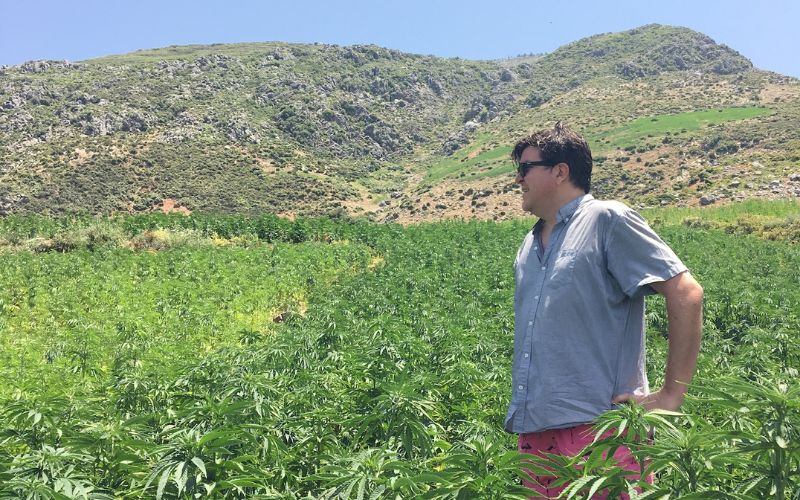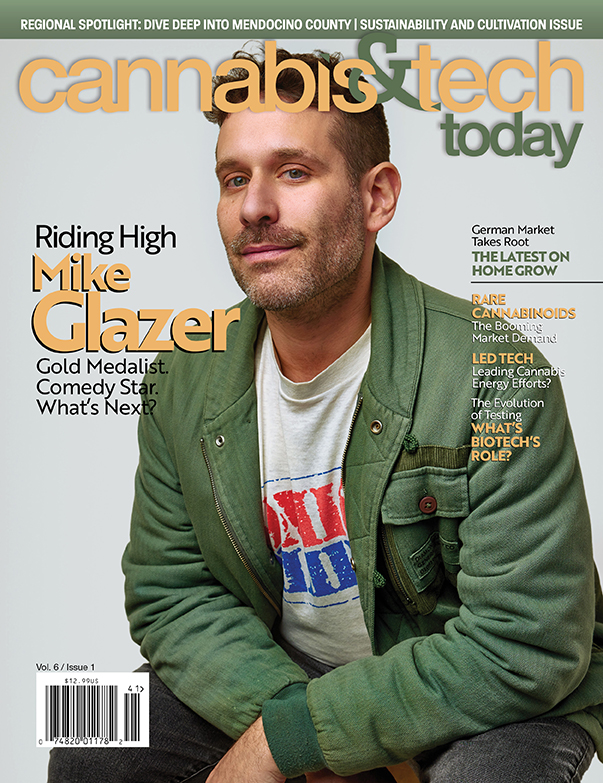Veteran journalist Ricardo Baca was The Denver Post’s first-ever cannabis editor, launching its news vertical The Cannabist in 2013.
In 10 short years, Baca has become an internationally recognized cannabis authority, appearing in documentaries and news segments, even dropping knowledge on TED stages when he’s not speaking at various panel discussions across the country. He is a columnist for several respected publications including Rolling Stone and Adweek.
While covering an emerging market in one of the nation’s first legalized states, Baca had a vision to create a business of his own.
In 2016, he launched cannabis PR firm Grasslands: A Journalism-Minded Agency. Grasslands represents some of the most influential cannabis brands in the industry, including Cookies, Puffco, and Housing Works Cannabis Co.
In this interview, first featured in Volume 5 Issue 3 of Cannabis & Tech Today, Baca discusses what inspired the creation of his public relations firm and how two-plus decades in journalism helped build its foundations.
Cannabis & Tech Today Editor-in-Chief Charles Warner sat down with Baca at Grasslands’ agency headquarters in Denver, Colorado.
Cannabis & Tech Today: Where do PR agencies like Grasslands offer the most value to their clients?

Ricardo Baca: I think the most value we could ever offer to our client starts at this very foundational construct of communication. This comes back to the foundations of Grasslands, because as I was wrapping up a 24-year journalism career, I already knew that PR and marketing agencies working in the space had a major problem, especially as they related to journalists and media organizations.
How are you developing these relationships with journalists? How are you maintaining them, and how are you being an exemplary partner to your media partners? I already knew there was a significant issue there, because I was in the belly of the beast running The Cannabist and also having 20+ years of journalism experience before the weed beat came my way.
Before starting an agency, I knew I needed to understand the agency-client relationship better. When I did that due diligence, I was pretty amazed to see there was one primary complaint coming from the client side about all of the agencies they had ever worked with. Talking to five or six mentors and people who have hired PR agencies themselves, they said they were really sick and tired of PR agencies overpromising and under-delivering.
And I get it, the pitch process is challenging. Business development is hard, especially when you’re in a space like PR and marketing where the ROI isn’t always obvious or hyper-defined. But I saw the white space, for an agency to be a better, more communicative partner to its clients, and a better, more helpful partner to its network of journalists. I’ve recognized that from the start, coming from the journalist side, as I know that what gets covered is what the journalist wants to cover.
And this is a big differentiator for Grasslands, because when we’re coming into these new relationships we’re managing expectations and having clear and transparent communication about what we can promise and what we cannot guarantee.
Before starting an agency, I knew I needed to understand the agency-client relationship better.
Ricardo Baca
How do you feel about the potential of the federal government rescheduling cannabis?
I’m bullish. It’s going to happen, and it cannot happen soon enough — as the modern cannabis business isn’t standing on equal ground with those in other industries. Schedule III will hopefully provide a temporary shelter for cannabis businesses to start catching their breath — and start planning for a future that very much involves federal legalization.
As the world’s first cannabis editor, where are journalists falling flat when it comes to cannabis coverage?
I have lots of thoughts on this, and it’s a complicated space. But I’ll start by saying, I give a lot of credit to the modern cannabis journalist. It’s a tough beat. Also, we know it’s a wide spectrum of what journalism is.
On one side you have “capital J” journalism, some of the stuff coming out of the Boston Globe, doing investigations on bad actors or bad regulators. On the other side of the spectrum, you have activist-centered journalism, which is important in a different way.
When High Times magazine flew me out to L.A. to interview for the editor-in-chief position five or six years ago, I was just coming out of traditional journalism. I asked them straight up, “Hey, can I hold the powerful to account? Can I write when that big brand is fucking up? Or when this regulatory process is eating shit — can I write about these things?” I heard from their leadership at the time that High Times will never write a negative word about any brand in the cannabis industry. They are on the other end of the spectrum of advocacy journalism.
While I appreciate a lot of the work that’s being done in the space, I would point out that sometimes modern cannabis journalism is too geographically centered in California. I’m not taking issue with the fact that California is the birthplace of the modern cannabis movement, of medical weed, of so much.
It is also home to some of the most talented geneticists, growers, manufacturers, distributors, and retailers in the world. At the same time, we have incredible professionals, businesses, brands, and work being done outside of California that deserves more of a spotlight than it’s currently getting.
I would also throw out that it seems like there isn’t a lot of serious journalism or reporting on this space now, and I don’t know if that’s a good thing for the industry. When I say serious journalism, what I’m looking for is, are we holding the powerful to account in the industry and the regulatory infrastructure?
I would like to see more serious journalism that digs into some of these issues and breaks them down for readers. Journalism is known as the Fourth Estate for a reason. It’s almost considered this unofficial branch of government that should be protected at all costs, of course, freedom of speech and assembly. We know that when we see stronger and more stringent journalism covering any industry, that industry will only be made better by that coverage.
And, this isn’t always a situation where journalists are falling flat, but I would argue the industry is falling flat in its lack of support for the good journalism that’s being done. I think it’s fair to say that a lot of cannabis executives take for granted the incredibly passionate and robust cannabis media ecosystem that we have.
Are they supporting Cannabis & Tech Today with a subscription? Are they subscribing to Tom Angell’s Patreon at Marijuana Moment? Are they supporting Jonathan Rose’s Substack Regulated State, or Jeremy Berke’s Substack Cultivated? Are they doing whatever they can be doing to support great journalism being produced across the cannabis media paradigm?
I would put it on the industry, because we are letting down the cannabis B2B media ecosystem when we need to be lifting them up. The industry needs to step up to be better supporters of the media ecosystem that has so faithfully and robustly covered them over the years.
Read the full interview with Ricardo Baca in the latest edition of Cannabis & Tech Today. Subscribe now to receive future print editions.
Author
-
Cannabis & Tech Today is the premier publication for inspiring business profiles, exclusive interviews with thought leaders in the field, science innovations, and insights on new legislation and growth in the cannabis market.







